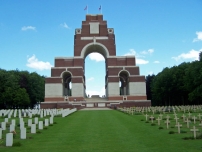| First Name: | Edward Charles | Last Name: | BYE | |
|---|---|---|---|---|
| Date of Death: | 02/07/1916 | Lived/Born In: | Hackney | |
| Rank: | Private | Unit: | Middlesex4 | |
| Memorial Site: | Thiepval Memorial, France | |||
Current Information:Born & Enlisted-Hackney
The opening day of the Battle of the Somme 1st July 1916
This was a disastrous day for the British Army in France. Eleven divisions of Fourth Army attacked along a 15 mile front from Maricourt to Serre. Two further divisions of Third Army launched a diversionary attack just to the north of Serre at Gommecourt. For a week beforehand the British artillery pounded the German trenches but the Germans had been there for a long time and they had constructed deep, concrete reinforced shelters beneath their trenches and many survived the bombardment. The troops went over the top at 7.30 am but even before they had left their overcrowded trenches, many had been killed or maimed by German artillery. The Germans knew that they were coming. Once in No-Man’s-Land the artillery continued to take its toll and then the machine guns opened up on the advancing British infantry. They fell in their thousands and the attack came to a standstill almost everywhere. Survivors sought cover wherever they could find it and at night they crawled back to their own lines, often dragging a wounded soldier with them. Only in the south were any advances made with the attack on Fricourt and Mametz. Over 19,000 British soldiers were killed on this day, including 2,500 from London. Originally part of 8 Brigade, 3rd Division, 4th Middlesex were transferred to 63 Brigade, 21st Division in November 1915. On 1st July 21st Division attacked just to the north of Fricourt with 4th Middlesex and 8th Somerset Light Infantry of 63 Brigade attacking on the right. At 7.25 am the leading platoons of A and B Companies attempted to leave their trenches and creep as close as they could to the German line but they were met with such fierce machine gun fire that they had to return to their own trenches. At 7.28 am two mines exploded nearby. Two minutes later the British barrage lifted off the German front line and the assault was launched. It was met by murderous machine gun and rifle fire. Most officers and NCOs of were among the casualties but small groups managed to enter the German line and some reached their support line west of the Sunken Road. Here they hung on despite heavy German attacks until the supporting battalion, 8th Lincolnshire came up. Meanwhile C and D Companies and Battalion HQ had suffered heavily from an estimated six machine guns whilst crossing no man’s land in the second wave of the attack. They reached Empress Trench and Lieutenant Colonel Bicknell, with a strength of about 100, decided to hang on in there and consolidate. Blocks were quickly erected and three attempts by the enemy to bomb up these trenches were repulsed. The failure of 50 Brigade on their right meant that Germans from Fricourt were able to work their way between the remnants of the leading and support companies. This was a critical situation for 4th Middlesex made worse by the situation on their left where only a few scattered parties of 8th Somerset Light Infantry had made progress. At 9.15 am the supporting battalions began arriving. 10th York & Lancaster drove the Germans from their second line trench to the left of 4th Middlesex and 8th Lincolnshire pushed through 8th Somerset to Lozenge Alley and the Sunken Road. At 11 am Brigade HQ ordered 4th Middlesex to form a defensive flank whilst the supports pushed on. This they did and their Lewis guns found many targets in Fricourt. 10th York & Lancaster and 8th Lincolnshire reached Dart Lane and Dart Alley and these positions were maintained overnight. This was one of the few places where any progress was made on this bloody day but even so 4th Middlesex paid a heavy price with nearly 500 casualties. Early in the following day, 2nd July, patrols discovered that the enemy had evacuated Fricourt and Fricourt Farm overnight. 4th Middlesex reinforcements, left behind the previous day moved up and the battalion spent the day bringing up urgently needed ammunition, especially grenades. There was some heavy shelling of their positions, but few casualties. However the records show that over 100 men from 4th Middlesex were killed on this day but it is probable that they died on the previous day and that their deaths were recorded incorrectly in the confusion. Alternatively they may have been killed on 3rd July, a day when no deaths were recorded but when, according to the History of the Middlesex Regiment a heavy shell landed in one of the trenches occupied by 4th Middlesex, killing and wounding 30 officers and men. Edward Bye was one of those from 4th Middlesex killed during this operation. |
||||
| « Back to Search Results | ||||
| If you think any of the information shown here is incorrect, Click Here to submit your amends and comments | ||||




